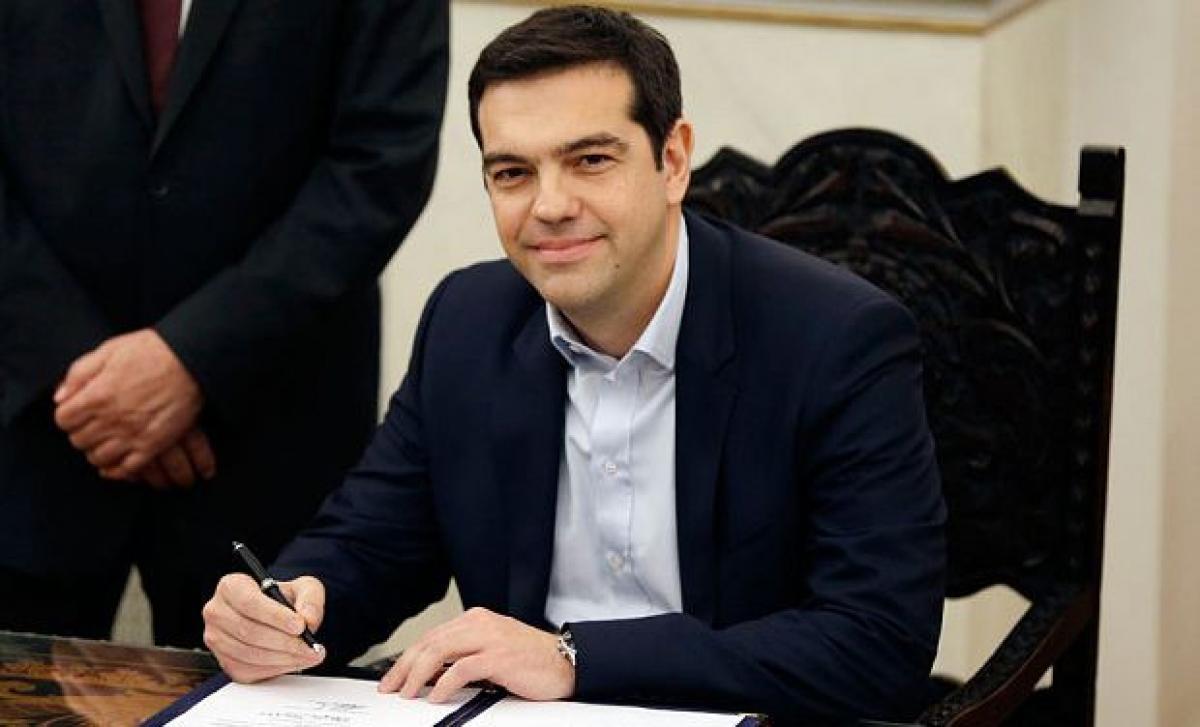Live
- G20 Leaders Will Talk About Climate, Taxes, and Trump's Return in Brazil
- COP29: CDRI announces $8 million funding for 12 projects to address climate crisis
- Anti-Telgu remarks: Actor Kasthuri Shankar moves court for bail
- Samsung AR Smart Glasses Set to Launch in 2025, Featuring Ray-Ban Meta-Like Design
- Kerala Industries Minister confident that new policy will boost plantation sector
- Madras HC plans inter-departmental monitoring committee to combat drug use in TN
- Bihar: Spotted deer dies due to heart attack in Banka district
- Mushtaq Ali T20: Shami to spearhead Bengal bowling attack, Gharami named captain
- Kharge's clarion call to oust Maharashtra's BJP-backed MahaYuti
- Why Ukraine’s Use of US Missiles Against Russia Could Lead to World War 3
Just In

x
Highlights
Greece will hold a referendum on July 5 on the outcome of negotiations with its international creditors taking place in Brussels on Friday, Prime Minister Alexis Tsipras announced.
Greece will hold a referendum on July 5 on the outcome of negotiations with its international creditors taking place in Brussels on Friday, Prime Minister Alexis Tsipras announced.

"The people must decide free of any blackmail the referendum will take place on July 5," Tsipras said in a televised address to the nation.
Tsipras spoke ahead of a critical meeting of eurozone finance ministers in Brussels today, amid heightened anxiety over a possible Greek default next on Tuesday that could potentially spark its exit from the euro, and even from the European Union.
Greece rejected its international creditors' offer of a five-month, 12-billion-euro ($13.4-billion) extension of its bailout programme on Friday, arguing it was unacceptable.
"For the last six months, the Greek government has led the fight to find a viable agreement that respects democracy," Tsipras said in his address broadcast on Greek television.
"We were asked to implement austerity measures allowing the deregulation of the labour market, pension cuts, and an increase in VAT on food products, targeting the humiliation of an entire people," the premier said.
"This is a historic responsibility that now appears for us to decide the future of the country in the coming days we will have to take decisions upon which future generations will depend."
Tsipras, speaking from the prime minister's residence in Athens, spoke for about five minutes directly to camera.
"Democracy deserved a boost in euro-related matters," Greek Finance Minister Yanis Varoufakis tweeted following the referendum declaration. "We just delivered it. Let the people decide."
The creditors the European Commission, the European Central Bank and the International Monetary Fund insist Greece must seal a deal this weekend to avoid an IMF default early next week.
However the Greek government argued the reforms demanded alongside the bailout extension would be "recessionary" and the funding "inadequate".
'Extraordinarily Generous' Offer
In response to the referendum announcement, a eurozone official in Brussels told AFP that the Eurogroup talks would still go ahead.
Questioned if eurozone ministers would discuss the current proposal, or a plan B if Greece has rejected the offer, the official replied: "That we will see. A number of countries want to debate plan B."
Varoufakis said earlier Greece had a "duty" to reach agreement with its international creditors on today.
German Chancellor Angela Merkel urged Athens on Friday not to waste an "extraordinarily generous" offer.
But even before his government rejected the proposal, Tsipras said he would refuse any take-it-or-leave-it offers, after a two-day EU leaders' summit dominated by the crisis.
The eleventh-hour creditors' move followed a week-long series of talks to end the stand-off between the creditors and Tsipras's leftist government, which has baulked at further reforms-for-cash after five years of harsh austerity measures and six years of recession.
Creditors are ready to quickly disburse 1.8 billion euros in financial aid to help Athens meet a 1.5 billion euro IMF debt repayment due next Tuesday, on June 30, as long as the Greek parliament approves disputed reforms, according to the proposals seen by AFP.
Tsipras told Merkel and French President Francois Hollande on Friday that he could not understand the creditors' "harsh" stance and asked for leeway.
But the eurozone's two most powerful leaders insisted that it was "vital now to work towards a deal", a source said.
Under the proposal, an immediate 1.8-billion-euro disbursement profits from Greek bonds held by the European Central Bank would be paid "as soon as the Greek parliament has approved with a resolution the agreement with the (creditor) institutions and adopted a first set of legislative actions".
Later payments, including money to cover huge payments owed to the ECB this summer, would come from the EU's firefighting rescue fund, the European Stability Mechanism, as well as cash currently dedicated to support Greece's banks.
Greece also wants debt cut as part of a solution to the five months of bitter negotiations over the unlocking of the final 7.2 billion euro ($8.1 billion) payout from its current extension, which expires on June 30.
An extension to Greece's massive 240-billion-euro bailout to the end of November would be the third since December and allow more time for heavily indebted Athens to negotiate future financing from its European partners.

Next Story
More Stories
ADVERTISEMENT
© 2024 Hyderabad Media House Limited/The Hans India. All rights reserved. Powered by hocalwire.com







